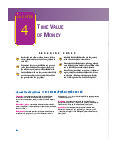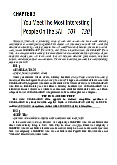







Preview text:
CHUYÊN ĐỀ
SỰ PHỐI HỢP THÌ – THE SEQUENCE OF TENSES
Một câu có thể bao gồm một mệnh đề chính (main clause) và một hoặc nhiều mệnh đề phụ
(subordinate clause). Khi trong câu có hai mệnh đề trở lên, các động từ phải có sự phối hợp về thì. I. Các quy tắc 1. WHEN
a. Diễn tả hành động xảy ra nối tiếp nhau
- Trong quá khứ: WHEN + S + V (quá khứ đơn), S + V (quá khứ đơn) Ví dụ:
When students heard the bell, they stood up and left.
(Khi học sinh nghe thấy tiếng chuông, họ đứng dậy và ra về.)
- Trong tương lai: WHEN + S + V (hiện tại đơn), S + V (tương lai đơn) Ví dụ:
When I see him, I will give him your regards.
(Khi tôi gặp anh ấy, tôi sẽ chuyển cho anh ấy lời hỏi thăm của cậu.)
b. Diễn tả hành động đang xảy ra thì có hành động khác xen vào
- Trong quá khứ: WHEN + S + V (quá khứ tiếp diễn), S + V (quá khứ đơn) Ví dụ:
When she was having a bath, she saw a mouse.
(Khi cô ấy đang tắm, cô ấy nhìn thấy một con chuột.)
- Trong tương lai: WHEN + S + V (hiện tại đơn), S + V (tương
lai tiếp diễn) Tương lai tiếp diễn: S + WILL + BE + Ving Ví dụ:
When you come tomorrow, they will be
playing tennis. (Khi bạn đến vào ngày mai, thì họ
sẽ đang chơi tennis rồi.)
c. Diễn tả hành động xảy ra xong rồi mới tới hành động khác
- Trong quá khứ: WHEN + S + V (quá khứ đơn), S + V (quá khứ hoàn thành) Ví dụ:
Last night, when we arrived at the theater, they had sold out all the tickets.
(Tối hôm qua, khi chúng tôi đến nhà hát, họ đã bán hết vé rồi.)
- Trong tương lai: WHEN + S + V (hiện tại đơn), S + V (tương lai hoàn thành) Ví dụ:
When you come back, I will have typed this email.
(Khi bạn quay lại, tôi sẽ đánh máy xong bức thư điện tử này.) 2. BY + TIME
a. by + trạng từ của quá khứ → động từ chia thì quá khứ hoàn thành Ví dụ:
I had worked for the company for 30 years by the end of last month
(Tôi đã làm việc cho công ty được 30 năm tính đến cuối tháng trước.)
b. by + trạng từ của tương lai → động từ chia thì tương lai hoàn thành
* Tương lai hoàn thành: S + WILL + HAVE + VP2 Ví dụ:
I will have worked for the company for 30 years by the end of next month
(Tôi sẽ làm việc cho công ty được 30 năm tính đến cuối tháng sau.)
3. AT + GIỜ/ AT THIS TIME
a. at + giờ; at this time + thời gian trong quá khứ → chia thì quá khứ tiếp diễn
b. at + giờ; at this time + thời gian trong tương lai → chia thì tương lai tiếp diễn Ví dụ:
At 3 p.m yesterday, we were learning English at school.
At 3 p.m tomorrow, we will be learning English at school. 4. SINCE
S + V (hiện tại hoàn thành) + since + S + V (quá khứ đơn) Ví dụ:
I haven't seen my old friends since we left school.
(Tôi đã không gặp lại những người bạn cũ kể từ khi chúng tôi ra trường.) 5. UNTIL/ AS SOON AS
a. S + V (tương lai đơn) + UNTIL; AS SOON AS + S+V (hiện tại đơn; hiện tại hoàn thành) Ví dụ: I will wait
you come back. (Tôi sẽ đợi cho đến khi em quay trở lại.) until
I will call you as soon as I have finished my work.
(Anh sẽ gọi cho em ngay khi anh xong việc.)
b. V (nguyên dạng)/ Don't + V (nguyên dạng) + UNTIL/ AS SOON AS +S + V (hiện tại đơn/ hiện tại hoàn thành) Ví dụ: Wait here
I come back. (Đợi ở đây cho đến khi mình quay lại nha!) until Don't leave the room I come back. until
(Đừng rời khỏi phòng cho đến khi mình quay lại nhé!) 6. By
c. BY THE TIME + S+V (quá khứ đơn), S+V (quá khứ hoàn thành) Ví dụ:
By the time you went to the cinema, the film had already started.
(Vào lúc bạn đến rạp chiếu phim, bộ phim đã bắt đầu.)
d. BY THE TIME + S+V (hiện tại đơn), S+V (tương lai hoàn thành) Ví dụ:
By the time you return, we will have bought a new house.
(Vào lúc bạn quay trở về, chúng tôi sẽ đã mua được một ngôi nhà mới rồi.)
6. WILL + V (nguyên dạng) - BE GOING TO + V (nguyên dạng) Thì tương lai đơn Thì tương lai gần WILL+ V (bare) BE GOING TO + V (bare)
1. Diễn đạt một quyết định ngay tại thời điểm
1. Diễn đạt một kế hoạch, dự định nói Ví dụ: Ví dụ:
I bought some paint. I am going to paint my house.
George phoned while you were out. OK. I'll phone him back.
2. Diễn đạt lời dự đoán không có căn cứ
2. Diễn đạt một lời dự đoán dựa vào bằng chứng ở Ví dụ: hiện tại
I think he will get the job. Ví dụ:
The sky is very cloudy. It is going to rain. 7. THE FIRST; LAST TIME
THIS; IT IS THE FIRST; SECOND; THIRD
TIME + S + V (hiện tại hoàn thành)
THIS; IT IS THE LAST TIME + S + V (quá khứ đơn) Ví dụ:
This is the first time I have ever met such a handsome boy.
(Đây là lần đầu tiên tôi gặp một anh chàng đẹp trai đến thế) This is
the last time I talked with you about that matter. (Đây là lần cuối
cùng tôi nói với bạn về vấn đề này.)
8. TRONG CÂU SO SÁNH HƠN NHẤT
S + V (hiện tại đơn) + THE + ADJ (est)/ MOST + ADJ + CLAUSE (hiện tại hoàn thành) S + V
(quá khứ đơn) + THE + ADJ (est)/ MOST + ADJ + CLAUSE (quá khứ hoàn thành) Ví dụ:
This is the most embarrassing experience I have ever had.
This was the most embarrassing experience I had ever had.
(Đây là trải nghiệm bối rối nhất mà tôi từng có.) II. Bài tập áp dụng
Exercise 1: Chia dạng đúng của động từ trong ngoặc 1. When I (come) , she was cleaning the door. 2. When I (come)
, she will be cleaning the door.
3. When he went home, his mother (cook)
dinner, so he took off his coat to help her.
4. When he went home, his mother (cook) . so be had a delicious meal,
5. When he went home, he (cook") because his wife were busv.
6. When he goes home, he (cook)
dinner because he wants to make his wife surprised.
7. When he goes home, his mother (cook)
because she always wants her son to have a
delicious meal after a hard work day.
8. When I moved here, I (live) in a remote area for 5 years.
9. When she receives the letter, she (call) you. 10. When I was young, I (harbor) the dream of a famous doctor. 11. When I grow up, I (get) married you. 12. When he grew up, he (join) the army. 13. When I see him, I (remind) him to call you. 14. When I saw him, I (remind) him to call you.
Exercise 2: Chọn phương án đúng
1. I your brother at Green Street yesterday afternoon. A. meet B. met C. have met D. had met 2. He a cigarette and to the window. A. light; walked B. lit; walks C. lighted; walked D. lights; walks 3. After she for help, she off her shoes and in to save him. A. shouted; took; jumped B. had shouted; took; jumped
C. had shouted; had taken; jumped D. shouted; had taken; jumped
4. I can't go with you because I my homework yet. A. haven't finished B. had finished C. finished D. finish
5. He for London 2 years ago and since then I him. A. have left; didn't see B. left; haven't seen C. eft; hadn't seen D. had left; have't seen 6. The performance at 7 o'clock and for 3 hours. We all it very much.
A. had started; had lasted; enjoyed
B. had started; lasted; enjoyed
C. started; had lasted; enjoyed D. started; lasted; enjoyed
7. Tell them to stop and take a rest. They long enough. A. have worked B. had worked C. have been working D. had been working 8. "You here before?” □ "Yes, I
my holidays here last year.” A. have you been; spended B. have you been; spent C. had you been; spent D. were you; spent 9. We
our housework by tomorrow evening. A. will finish B. will have finished C. will be finishing D. are going to finish 10.
"Your face is dirty, Tom.” □ "All right, I it.” A. am washing B. am going to wash C. will wash D. will have washed 11. Coming into the room, he Mary where he her. A. see; left B. saw; had left C. had seen; left D. saw; was leaving 12. I from him since he two years ago. A. hadn't heard; disappeared B. haven't heard; disappeared
C. didn't hear; has disappeared D. will not hear; disappears 13. After the guests
she back into the living-room and off the light. A. left; went; turned B. had left; had gone; turned
C. have leftt; will got; turned D. had left; went; turned 14.
By the time you finish cooking they their homework. A. will have finished B. will finish C. had finished D. have finished 15.
"You have just missed the last train.” □ "Never mind. I ” A. will be walking B. am going to walk C. will walk D. am walking 16. "I
the way to the Globe Theater.” □ "OK. I you.” A. don't know; will show B. won't know; will show C. don't know; am showing
D. don't know; am going to show 17. Come in, please. I for you long. A. have waited B. have been waiting C. had been waiting D. have been waited 18. Who you
to the cinema with last night? A. went B. did you go C. had gone D. did you went 19.
Detective: I'm afraid I must ask both of you. What at 10.20 p.m yesterday? Mr. X: I chess with my wife. Mr. Y: I to a play on the radio.
A. were you doing; am playing; was listening
B. did you do; played; listened
C. were you doing; am playing; am listening
D. were you doing; was playing; was listening 20. You my sister for a long time come to see us tonight? A. haven’t seen; Will you B. won't see; Will you C. hadn't seen; Would you
D. haven’t seen; Are you going
Exercise 3: Tìm và sửa lỗi sai trong câu
1. This is the most beautiful place I ever visit.
2. This time next week they will sit in the train on their way to Paris.
3. The radio has been played since 7a.m, I wish someone would turn it off.
4. I came late to class. When I entered the teacher writing something on the blackboard.
5. They will have English from nine to ten in this room. Don't annoy them then.
6. Imade cakes. That's why my hands are covered with flour.
7. Igot a sore throat because I have been speaking for 3 hours.
8. It is raining hard. We can't do anything until it stopped.
9. She had got into her shoes, put on her coat and went to the door. 10.
What tune had they played when we came in? 11.
That evening we stayed up to talk about the town, where he has lived for a long time. 12.
I have lived in this city for 15 years. My family had moved here when I was 10 years old. 13.
We are very tired. We have walk for three hours. 14.
I haven't seen her since we leaved school. 15.
I have been thought about you a lot lately and I have come to conclusion that I won't be able to live without you. 16.
Coming into his room, he found that someone broke into it. 17.
It always rains when they had just cleaned the windows. 18.
The last time I saw him, he wore a black suit. 19.
By the first of next July I had worked for this company for 20 years. 20.
This is the talking between two friends who had just met up each other.
Exercise 4: Chia dạng đúng của động từ trong ngoặc
1. Last night, we (watch) television when the power (fail).
2. We (be) in this class for 4 years next September.
3. When we came in, they (prepare) the meal for us.
4. There (be) many changes in our village in the past few year.
5. Think carefully. I'm sure you (remember) his name.
6. After ancient Greek athletes had won a race in the Olympics, they (receive) a simple crown of olive leaves.
7. They (build) that bridge when I (be) there last year, they (not finish) it yet.
8. As soon as my parents came, we [go] out for dinner.
9. I (search) everywhere for the pen I (lose) yesterday. 10.
"What you (do) at the moment, Ann?" "I (pack). I (catch) a plane to London tomorrow morning." 11.
Since I left Venezuela six years ago, I (return) to visit friends and family several times. 12.
When my parents (arrive) for a visit tomorrow, they will see our baby for the first time. 13.
Don't worry. I (finish) the report by 10 o'clock. 14.
I'll return Bob's pen to him next time I (see) him. 15.
"I [go] out to buy a morning newspaper." "But it (rain) now. Why don't you wait until the rain (stop)?" 16.
Whenever I travel abroad, I (forget) something I need. 17.
Hurry up or you (be) late for class. 18.
He (be) to the theater three times this month. 19.
Hurry up or the film (be) over before we (get) home. 20.
Before I (start) the car, all passengers had buckled their seat belts.
Exercise 5: Chia dạng đúng của động từ trong ngoặc
I. I'm going out for a walk. I (read) too long.
2. I (do) my homework when my mother (send) me to the chemist's with the prescription the doctor (give) her.
3. By the end of this week I (read) 200 pages of my new novel.
4. He (do) the experiment when the light (go) out.
5. At this time next week, we (live) in USA.
6. He (work) on the report at this time tomorrow.
7. Go on the next test as soon as you (finish) this one.
8. When I (look) at my suitcase, I could see that somebody (try) to open it.
9. We (be) a few minutes late, so the film (start) when we (get) to the cinema. 10.
I'm going to bed now. I (work) for hours and I'm very tired. 11.
I think she is the nicest person I (meet). 12.
He [come] into the room after he (stand) outside for a moment. 13.
After the telephone (buzz) for a minute, the doctor (answer) it. 14.
He (have) a bad fall while he (repair) the roof. 15.
Yesterday, when I (see) Tom he (sit) in a corner with a book. I (tell) him that he (read) in very bad light. 16.
James (weed) while Alex (cut) the grass in the garden this time yesterday. 17.
Susan (wait) for you at 9 o'clock tomorrow. 18.
By next summer, she (finish) her 3rd novel. 19.
This is the first time we (see) the Statue of Liberty. 20.
By the time Anne graduated from high school, she (attend) seven different schools because her parents moved frequently


